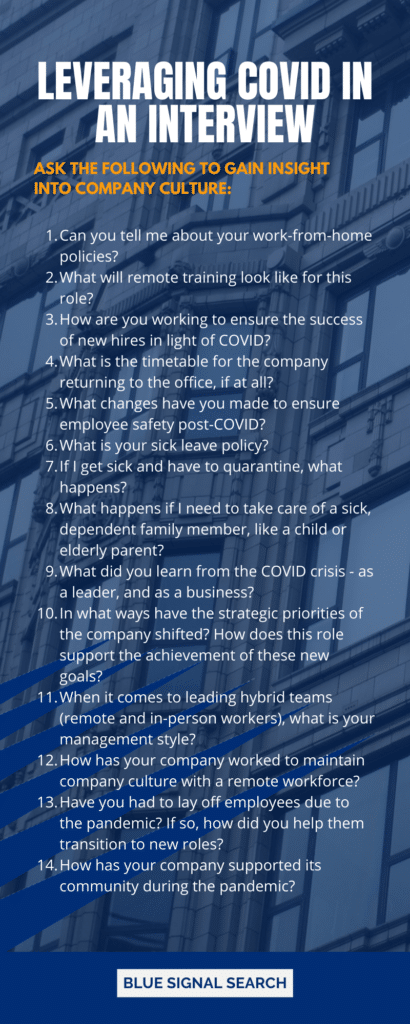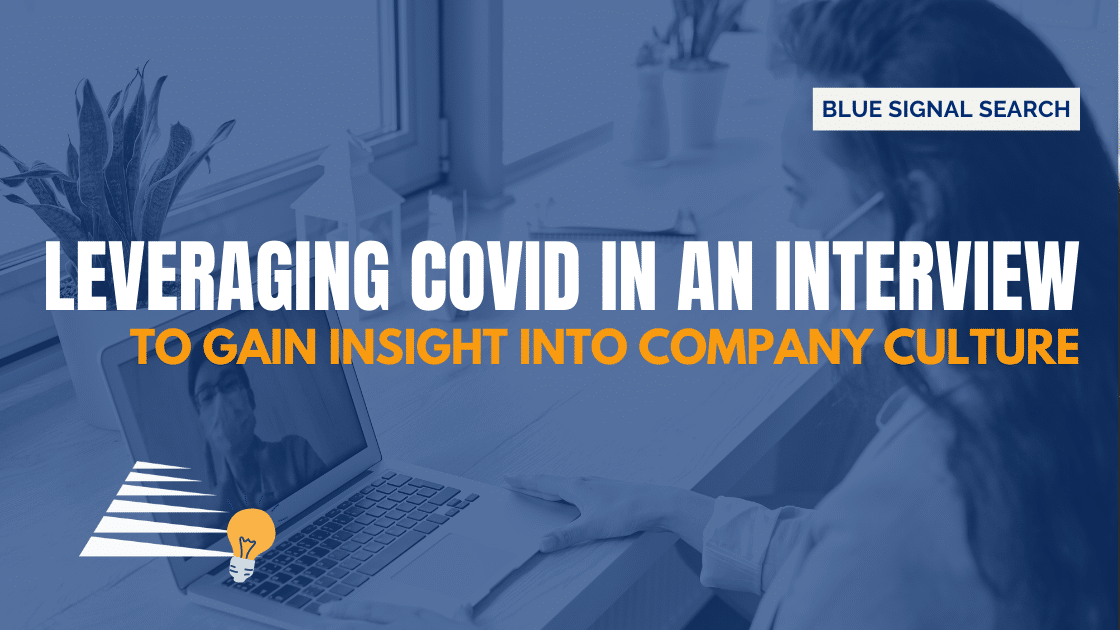The Coronavirus pandemic has caused unmeasurable hardships on people and businesses worldwide, yet unwittingly brought about some of the greatest innovation and adaptation we will ever see in our lifetime. Companies all over the world have reimagined their customer experience, relocated their workforce, and deployed incredible technologies that have prioritized safety and security in spite of the virus. Considering all of this, leaders everywhere are asking the same question, “what comes next?” What was once considered a quick fix to a pressing problem might be the new norm - whether that be working from home, or re-emphasizing e-commerce in the marketplace.
This changes a lot in the way of the workforce. As many look for new jobs post-pandemic, it’s important that we rethink the traditional interview philosophy that the company is only vetting you, and not the other way around. As a candidate that brings a lot to the table, make sure you are asking the right questions to ensure this company is the place for you. With COVID as a good benchmark for how a business values the security and safety of its employees, utilize the following questions to gain the best insight into the true culture of a company.

The Ones They Prepared For
Being top of mind, hiring managers and interviewers by now must have mastered their post-COVID-19 game plan. Most of their work for the past several months has revolved around how they will handle remote onboarding, work from home policies, and the benchmarks they seek to achieve with this new business model. Consider asking these questions to get a sense of how they are looking to manage these challenges:
Can you tell me about your work-from-home policies?
- This is a pretty basic question. If they plan on having you work remote, you will want to know what your schedule will be like, what hardware they might provide for you to complete your work, and what communicating with your team will look like. Set these expectations early! Better yet, ask if these are outlined in the employee handbook and request a copy to review.
What will remote training look like for this role?
- Assuming you will be working from home for the foreseeable future, you probably will not go through their traditional training program. As an organization, they will have a good idea of how they will onboard you into your role. Recall how you learn best and try to advocate for yourself here. If you learn best at your own pace, you might want to look for a company with a preset online training module that you can work through. Or, if you work better by bouncing ideas off someone, look for an employee shadowing training opportunity.
How are you working to ensure the success of new hires in light of COVID?
- Try not to think of this as a philosophical question. You don’t want to work for a company that just “gives you tools and hopes for the best” - you want to work for a company that has a support system ready to go and has goals in mind for what they want this role to achieve for them. Ask what success looks like in this remote role, and how the training is set up to ensure you get there.
What is the timetable for the company returning to the office, if at all?
- Make sure you know what you’re getting into. Ask if the end goal is to have this role working back in their brick and mortar headquarters, or if they see this position being permanently remote. Note which workplace style you prefer, and make your decision based on what the position will offer you long-term.
Covering the Logistics
Businesses have had to pivot to reshape their safety and time off blueprints, especially in essential industries and in-person positions. Before committing to a role, you will need to know how the company has outlined rules and regulations to keep you healthy and employed. We suggest asking these questions NOT in the initial interview, but maybe in the second or third interview when you are anticipating a job offer. Just like asking about compensation and perks in your initial introduction, asking about sick leave and related policies can sometimes give off the wrong impression. Be strategic with when and how you ask the following:
What changes have you made to ensure employee safety post-COVID?
- Prior to the pandemic, they surely had PTO policies and safety protocols that were in place to meet mandated regulations, but with COVID-19 that all would have changed. You can cut past the standard items with this question and get right down to the updates.
What is your sick leave policy?
- With COVID, some employers might have rethought their rules regarding doctor’s notes and other guidelines that qualify time off as sick leave. The laws regarding what is required by businesses differ by state. Know your state’s laws before going into your interview by checking here.
If I get sick and have to quarantine, what happens?
- It’s important to set expectations ahead of time in these situations. Remember, if you’re not going to be working in a remote capacity, the regulations they have set for this role are the same regulations set for your coworkers after they fall ill. Make sure that whatever their policy, it is something you are comfortable with.
What happens if I need to take care of a sick, dependent family member, like a child or elderly parent?
- Hopefully this is never a situation you will have to navigate, but in that instance, it’s good to know where you stand with your employer. Let them know your responsibilities outside the workplace to best gauge if this is the type of work environment that meshes well with other aspects of your life, too.
Uncovering the True Company Culture
Unfortunately, it’s all too common that you enter a job interview and are promised the moon and stars in a new role. With some interviews giving an impression of glitz and glam, it’s easy to get caught up in the excitement of a prospective new opportunity and miss some red flags. The Coronavirus pandemic has given prospective employees a unique opportunity to ask companies acceptable - but telling - questions about a role. Use the following questions to get some insight into a business’s actual priorities and overall culture:
What did you learn from the COVID crisis - as a leader, and as a business?
- Try not to lead this question to employees, revenue, production, or anything else. Ask it plainly and then wait to hear what they say. Without giving context, this will give you a realistic view into what is top-of-mind for this particular manager in that particular department. Depending on the direction they go, you can get some major insight into how they prioritize their employees by either mentioning their teams or - even more telling - by not mentioning their team at all.
In what ways have the strategic priorities of the company shifted? How does this role support the achievement of these new goals?
- This is a great question to get a sense of the direction the company has shifted. Maybe they expanded their service offerings to gain better footing in new industries or doubled down on their current target markets. Whatever the case, it’s beneficial to know how this particular position plays into their long-term strategy to better understand what is expected of you if you were to land the job.
When it comes to leading hybrid teams (remote and in-person workers), what is your management style?
- As mentioned before, it’s pertinent to look for what it is you need to succeed. Maybe this manager is super hands-off with their remote workforce, but deep down you know that you need more structure in your role to stay on task. In which case, you might prefer the other role with a manager that schedules end of day check-ins with their team.
How has your company worked to maintain company culture with a remote workforce?
- As part of the appeal of this candidate-driven job market, you should know what kind of team environment you are stepping into. Maybe you need a competitive space to outperform your peers in sales, or maybe you need a lot of camaraderie to feel fulfilled in your role. If this is your first remote role, and you thrive in an immersive company culture, seek that out. Talk to the interviewer about things they have done to maintain that togetherness despite physical distance.
Have you had to lay off employees due to the pandemic? If so, how did you help them transition to new roles?
- Tread lightly with this question! If you feel like this new position could be a risky move, this question could help you investigate its job security further. Of course, the interviewer probably won’t talk about any less than agreeable terminations, but watching their body language and hearing their take can give a valuable perspective.
How has your company supported its community during the pandemic?
- If social responsibility marks high on your list of things you want in a future employer, this question can help you discern a company’s sentiments. There could be situations where they did their best by just keeping their heads above water after the market crashed. In this case, you could add value to your candidacy for the role by discussing ideas on cost-effective ways for the company to give back.
Certain questions asked in particular ways can uncover answers that aren’t explicitly stated on career pages or in job descriptions. With the Coronavirus, candidates have been given a whole new arsenal of inquiry that is founded in safety and concern, yet reveals much more in terms of company culture and priorities surrounding employees in a workplace. Interviewers will unintentionally tell you a lot more there is to know about a company and a role than intended if you know what to look out for. Use this to your advantage! Find a company that fulfills all that you require from an employer - from protective safety measures to ethics and values that are on par with your needs.
Interviews can feel like a very strategic song and dance. And in a way, they are! There is a certain etiquette that needs to be maintained to give off your best impression, but that doesn’t mean you can’t gain beneficial insight from them to help your decision-making before accepting a role. Use these tips and questions carefully, and they will help you uncover some truths about a company and how they will take care of you as an employee. For more tips and tricks on getting the most out of your interviews, download our comprehensive guide.

